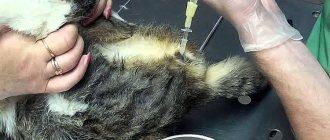It is impossible to prepare for death in advance - it will always be a blow. Whether it is relatives, close people or pets, the bitterness of loss overtakes the mourner, leaving him in a difficult state. Most owners will have to face the death of a pet, one way or another, since the life of a cat or dog is much shorter than the life of a human. When we get an animal, we know deep down that it will not outlive us, but we prefer not to focus on this. The question of how to survive the death of a cat appears during the immediate experience of loss and leaves a person in confusion and despair. We will talk about how to understand this loss and, if possible, cope with it in this article.
How to survive the death of a cat
Experiences associated with the death of a pet
As a rule, the first two days after the death of a pet close to a person, he is in a state of shock and is not able to fully “digest” any feelings. At such moments, it is possible to deny what happened, and a complete absence of any feelings, which arises as a result of protecting the psyche from a barrage of experiences.
In the first days after the death of a pet, it is difficult for a person to believe what happened
Such “anesthesia” allows a person to cope with current events, but it takes a lot of energy. Therefore, when the mourner comes out of shock, he often feels depressed and completely powerless.
Hallucinations or rich imagination?
At first, many people think that they hear their pet’s steps around the apartment, or see their blurry silhouette, which ultimately turns out to be an optical illusion. The presence of such “symptoms” does not at all indicate a mental disorder or hallucinations, which is what people often think about.
The desire to meet the cat again can even lead to auditory and visual mirages of his presence
Denial of death, natural for an unprepared person, forces his psyche to work in emergency mode. Imagination can create amazing things with people (especially those under severe stress) and “fulfill” wishes, bringing pets back to life through fantasy.
A bereaved cat owner may see him everywhere
Therefore, when you automatically look around, when you hear the patter of familiar paws or a dear meow, then you behave completely normally. In the end, such behavior is also influenced by habit - if you have lived under the same roof with an animal for many years, seeing it “everywhere” in the apartment is an established way of behavior.
Anger at the whole world or universal injustice
One way to avoid realizing the inevitability of a pet's death is to blame everyone who, in one way or another, was involved in it. Veterinarians often fall under the “hot” hand, making incorrect diagnoses and giving the cat bad pills. Sometimes loved ones who did not give the pet enough attention also come under attack.
In moments of acute grief, a person may refuse any help, which causes even greater damage to him
The feeling of injustice coexists perfectly with the feeling of loneliness - after all, the person who is grieving (as it seems to him) was treated unfairly. All the misfortunes of the globe are concentrated around him, while other people live happily. That is why such embitterment is accompanied by isolation from others and frequent refusal to accept any help.
Vulnerability is usually hidden behind attacks of malice and anger
Despite all the acute feelings, embitterment is a variation of defense that allows you to distribute responsibility for the death of your beloved pet to everyone except yourself. A person is not yet ready to take on this responsibility, so he uses the projection mechanism, “demonizing” the people around him.
Accepting Guilt
Sooner or later, having cursed everyone he can and cannot, a person remembers that the pet belonged to him, which means he should blame himself for the death. On the one hand, awareness of guilt is a big step forward, since a person manages to distract himself from anger at the world and accept its true origins. On the other hand, it is very easy to drown in feelings of guilt if you do not give yourself the opportunity to let go of the animal in time.
The death of a pet provokes attacks of self-blame for negligence and indifference to the cat
In the head of every caring owner, after the death of a beloved cat, the thought involuntarily arises: “I made a mistake somewhere, because of which my cat died. By and large, it was I who killed my pet.” Perhaps the owner will decide that he did not take his pet to the veterinarian often enough, or trusted him to bad specialists. Perhaps he will begin to remember how he threw a slipper at the cat when he dropped the geranium five years ago.
Self-flagellation can result in prolonged depression if a person does not consult a psychologist in time
It is during the period of intense experience of his involvement in the death of an animal that a person analyzes in detail all the years he has lived with him and looks for his mistakes. Of course, there are mistakes because no one is perfect. The subsequent revaluation of these mistakes and their elevation to the status of “fatal” or “fateful” is dangerous.
In order to avoid subsequent feelings of guilt, it is advisable to thoroughly study the characteristics of the cat’s body and its care, which will increase the likelihood of the pet’s longevity. It is also advisable to familiarize yourself with possible diseases of cats, so that if symptoms appear, you can see a veterinarian before the onset of disastrous consequences.
Deep depression
The feeling of guilt was based on the idea of one’s own omnipotence and the opportunity to change everything for the better, even if it was lost. Depression is characterized by complete giving up. The person understands that regardless of the quality of care provided, he would still lose his cat.
Guilt often turns into an all-encompassing feeling of helplessness, leading to despair
We are not responsible for all events in the world and are able to influence - this thought is subject to exaggeration during periods of depression, acquiring distorted outlines. “I’m not capable of anything, I can’t do anything. I am nothing". It is these attitudes that accompany depression, which is characterized by apathy and intense withdrawal. Grief seems to be locked somewhere deep inside and has no way out.
Loneliness and distance from loved ones only makes the situation worse
This condition is dangerous because it is hidden from others. At the moment of depression, a person can return to his normal life and appear to be satisfied with life and even a happy member of society. Moreover, depression can be hidden from its owner if there is sufficient resistance.
Long-term suppression of negative emotions sooner or later leads to a sharp release, associated with the most alarming consequences, including suicide.
How to Deal with the Pain of Losing a Pet
The strength of grief and the depth of sadness depend on many factors, and if one person can easily cope with the death of a dog or cat, then another will mope for months. Surprisingly, children tolerate the death of pets more easily than adults, since the child’s psyche is more mobile. Children, unlike adults, express their emotions more vividly and are in the process of constantly learning about the world, so for a child the question of how to survive the death of a cat or dog is not worth it - the baby will cry for several minutes or hours, then be sad for a day or two, and then new emotions and impressions will take the place of sadness. Adults who don't know how to cope with the loss of a pet should take a cue from their children and allow themselves to express their emotions first and then let them go. The following tips can also help cope with the pain of the death of a beloved dog or cat:
Cry. Tears are a natural reaction to grief, and often people feel better after crying. Containing and suppressing negative emotions, on the contrary, can cause stress and depression.
Don't blame yourself for what happened. After the death of a beloved animal, many people blame themselves for not being attentive and caring enough and not noticing the pet’s illness in time or not keeping an eye on it.
However, in fact, it doesn’t matter whether the animal’s owner is to blame for what happened or not, because nothing can be changed, and the feeling of guilt will interfere with enjoying life. Getting rid of the feeling of guilt is simple - just admit that no one is perfect and everyone can make mistakes, and it is impossible to predict how everything would have turned out if the owner of the animal had been more attentive/caring
Remove things that remind you of the loss from your eyes
It is better to remove the food bowl, sleeping mat, leash, toys and other things that belonged to the deceased dog or cat out of sight, since they are no longer needed in everyday life, but serve as a constant reminder that the pet is no longer there. It is also better to put photographs of the deceased animal in a photo album.
Share your grief with friends. Surely, among the friends of someone who has lost a pet, there are people who have also experienced the loss of a pet who will be able to understand the grief of the owner of a deceased dog or cat and provide friendly support
Focus on the good memories associated with the deceased pet, rather than on memories of its death. Every time thoughts about the death of a dog or cat arise in your head, you should try to “switch” to memories of the time when the animal lived and brought joy.
Symptoms of bereavement
In addition to all the familiar reactions, such as tears and sadness, there are other manifestations of grief, which, if not known, can be mistaken for lack of concentration, eccentricity, and other qualities. Among the main manifestations of grief are the following:
- Physiological. Physiological symptoms of acute negative experiences include a painful feeling of tightness in the chest area, a feeling of emptiness in the abdomen, spasms in the throat and the feeling of a lump stuck in it;
A lump in the throat is an eternal companion of acute emotional experiences
- Behavioral. A person experiencing grief often seems inconsistent and inattentive. His gaze can be described as absent, absent-minded. The inability to concentrate on business often irritates household members or colleagues, which leads to painful conflicts. Other manifestations include insomnia, which further increases absent-mindedness;
- Cognitive. A grieving person may encounter unusual holes in his memory, confused thoughts that do not want to take on concrete shape. Difficulty focusing and concentrating is common. The person seems to be “not here”;
Absent-mindedness always affects performance, which leads to additional conflicts
- Emotional. The feeling of loneliness that accompanies people who have experienced loss is accompanied by a heightened awareness of their own helplessness, causeless anxiety and all-encompassing guilt, to which the person indulges.
Practical advice
The death of a cat is equally difficult for both women and men. A severe emotional state during this period can lead to depression and other psychological illnesses. This can happen if you focus only on your grief and fall out of active life.
shutterstock
To prevent this from happening to you, use the tips below:
- Talk to the people who care about you. Don't bottle up your emotions or suppress them. Talking to people close to you and getting support will help you feel better. Suppressing emotions sometimes leads to various diseases, both physiological and mental.
- Avoid communicating with people who may hurt your feelings. Unfortunately, not all people are kind and want to listen to other people’s problems about the death of a cat. If you start telling them about your grief, you may encounter a rude response, which will worsen your condition. This doesn’t mean that people are bad, it’s just that not everyone likes to hear about other people’s grief. Especially when they have their own problems.
- Try not to react to statements such as: “stop whining”, “what are you like little”, “died and died” and the like. Focusing on such caustic phrases will not do any good. Remember that you have the right to express your emotions the way you want. People have no right to tell you that you shouldn't experience grief.
- Don't fall out of life. Remember that you have a family and possibly other animals. Spend time with them and take care of them. Life does not end with the death of a cat, there are also other people and animals around who need you.
- Do something to distract yourself. If you don't have a hobby, find one. Go in for sports, as during exercise a person produces a hormone of happiness. Take time for yourself, relax, read a book or get out into nature. These hobbies will help you feel better.
By following these tips, you will not get rid of grief completely; you will still have to go through a difficult period after the death of your cat. But you can distract yourself and make it less painful.
Stages of Grief
Despite the fact that each person experiences the loss of a pet in his own way, psychologists identify general phases of accepting death, through which, with minor changes, everyone who is faced with this event goes through.
Table 1. Stages of Grief
| Stage | Description |
| Denial of what happened | With his mind, a person clearly understands what he is faced with and what the consequences will be. He can begin to organize the funeral of the pet or deal with the cremation of his body. Often the numbness that engulfs people in such cases is completely invisible from the outside. Moreover, while the owner of the deceased pet is in contact with other people, he does not lose touch with reality, which allows him to be aware of what is happening. In some cases, people, on the contrary, can withdraw deeply into themselves and even stop responding to surrounding stimuli. Then it is necessary to bring them to their senses with a calm conversation, constantly calling them by name. |
| Resentment and anger | An offended person feels that someone else is to blame for the death of his pet. This person may hide a specific enemy, or the whole world, depending on the mood of the victim. A person experiencing the stage of anger can show negative emotions even towards the closest people, unexpectedly lashing out at them. The duration of this phase depends on a person’s energy reserves and the ability to analyze their own actions. As a rule, embitterment does not last long due to the great intensity of the experience. |
| Guilt | The experience of guilt is accompanied by a recollection of all the moments in which a person showed himself to be a “bad” owner. As already mentioned, you can always find such moments, however, it is in this phase that a person becomes fixated on such episodes, blaming himself for all sins. If you are unable to hear yourself and analyze the feelings that surround you, a person risks carrying this feeling throughout his life. |
| Depression | The course of this phase largely depends on the person’s temperament, as well as on his environment. Open people find it easier to share their emotions, and when they are heard, they have a better chance of accepting their loss as quickly as possible. More hidden individuals prefer to keep their grief to themselves, but if they have a circle of people they can trust, the problem of self-expression disappears. It is first of all important for a person with depression to be heard by himself, which he can do through a frank conversation |
| Acceptance of what happened | Having gone through all the “circles of hell,” a person spends all his energy resources and comes to rational acceptance of the inevitable. Unlike the first shock stage, this phase is characterized by greater awareness, although it does not exclude some detachment from the owner of the deceased cat. Previous attacks of self-blame and anger subside, and their relapses occur less and less often. However, you should not think that acceptance happens instantly - it is a long-term work that requires a lot of strength from a person and is draining. This is why it is important for bereaved people not to be alone for too long and not to feel abandoned. |
| Renaissance | At this stage, a person says goodbye to the past and opens up to the present. Of course, there is no need to talk about a simple transition from the gloomy “past” to the bright and beautiful “future”. In any case, the ghosts of the past will visit a person, since it is impossible to remove a deceased pet from the memory. It is possible to change the very attitude towards such memories. Over time, a person will stop identifying himself with the pet’s executioner or with the victim who suffered all the misfortunes and begins to perceive death as a fatal inevitability for which there is no one to blame |
| Reorganization of everyday life | After the death of an animal, many reminders of it remain in the apartment - from joint photographs to bowls. Some people deliberately leave “traces” of their deceased pets years after their death, thereby prolonging their life on an imaginary level. Some people experience a radical change in their living conditions, even moving |
A grieving person goes through several vivid phases, the awareness of which will help him in working on himself
What might the child's reaction be?
Each person reacts differently to different events, and a child is no exception. His behavior will depend on two factors:
- degree of attachment to a pet;
- emotionality.
Negation. If your child was not an eyewitness to the tragedy, then such a first reaction to the news of the death of a pet is very likely. A defense mechanism kicks in: while denying the fact, hope remains. The child needs some time to understand and accept what happened. Usually the denial stage lasts a few minutes. At this time, parents should not continue to insist, just being nearby is enough.
Anger. Most often, an outburst of anger can occur after denial. The child has already accepted the information and is now trying to emotionally discharge. Perhaps he will try to look for those to blame for what happened and scold them. For example, the driver of a car under whose wheels a beloved dog died. What should parents do at this moment? It’s not worth denying the guilt of someone who actually became a participant in the tragedy, but it’s also not worth developing this topic. It is best to agree with the child's accusations, but at the same time try to calm him down. To do this, you can report the remorse of the participant in the accident; that everything happened unexpectedly for all parties.
Read more: Suicide: signs, causes and types
Fear. After hearing about the death of a pet, children may experience fear for a long time. It will be connected with the fact that life can end unexpectedly and you can lose a loved one without even having time to say goodbye to him. Most likely, the child will not admit it. You can guess this by his behavior. For example, your son or daughter could previously fall asleep calmly after reading a fairy tale, but now they ask you to lie down with them. Or they started hugging and kissing you more often than usual, asking when you would come home from the store. Your child experiences fear of loss, which is associated with the death of a pet.
Your actions:
- Do not deny your child affection. The gentle touch of mom and dad will help the baby feel safe.
- Talk about the fact that death is a natural phenomenon; sooner or later all living things go through this state; that it is not possible for a person to foresee this moment, but one should not darken one’s life by waiting for sad news.
Depression. Older children are susceptible to this condition after the death of a pet. Depression is caused by fear of loss
It is important to recognize your offspring’s condition in time and help him
What is worth paying attention to: the child has ceased to be interested in what was previously important to him; began to spend time alone more often; he is not happy with what used to delight him
How to help your child cope with this condition:
- More attention. Involve them in household chores, walk together more often.
- Intimate talk. Be the first to tell us about your feelings about the death of your beloved animal.
- Remind that life is not only about sorrows and losses, but also about joy and the acquisition of new things. The happiness is that we don’t know when and what will happen.
Read more: Parents’ influence on a child’s success in the future
Guilt. Sometimes it happens that a child begins to blame himself for what happened, even if this is not true. The phrase “if I had gone for a walk with Rex” suggests that your child allows for a different scenario, provided that he should have done something differently. You can overcome hidden feelings of guilt by talking about the fact that it is impossible to foresee everything in this life.
Euthanasia of an animal
The euthanasia option, which involves euthanizing the cat at the owner’s request, requires special attention. In the event of such an artificially caused death, the cat’s owner often begins to be haunted by the feeling that the pet’s “blood” is on his hands. At the same time, the person completely forgets about the reasons that prompted him to take such a radical step.
Euthanasia is a very difficult step that is difficult to come to terms with
Euthanasia is offered in cases where the pet is seriously ill or has suffered serious injuries that are not life-threatening. The purpose of euthanasia is to relieve the animal from suffering, which in any case would lead to imminent death. Thus, euthanasia is the lesser of two evils.
You shouldn’t expect a quick, rational understanding of euthanasia and its motives. Euthanasia is always a very difficult and responsible step that is difficult to come to terms with. The idea that you are the cat killer is inevitable. Therefore, all that remains is to deal with it competently. It is unlikely that the argument that euthanasia would have saved the cat from more terrible torment will seem convincing to even one mourner.
To ease the suffering, try to explain to yourself that without euthanasia your pet would have to suffer longer.
What to do first?
IMPORTANT: Ask yourself, is this process irreversible? Perhaps you can help your furry friend, conduct a full examination, and only then start thinking about further actions. It happens that death is the best way out in case of serious illness or injury
There are cases of euthanasia. Remember that your pet has lived a long and rich life. If this is still just a kitten (which is very sad), then think that it will become easier for him there. How can you tell if your cat is dying?
It happens that death is the best way out in case of serious illness or injury. There are cases of euthanasia. Remember that your pet has lived a long and rich life. If this is still just a kitten (which is very sad), then think that it will become easier for him there. How can you tell if your cat is dying?
Symptoms of a dying cat:
- Refusal to eat and drink;
- Rapid breathing;
- Low temperature and pressure;
- Slow heartbeat;
- There may be an unpleasant odor from the pet.
When do you need help from a psychologist?
Not only children, but also adults may need a specialist. For some people, the thought of going to a therapist is immediately repellent due to the negative associations that are, unfortunately, very common these days. The madhouse, the pills, the orderlies have nothing to do with psychotherapists who help people in difficult life situations.
People often neglect the help of a psychologist due to various prejudices
You can understand that you need the help of a psychologist if a person has the following conditions:
- You are haunted by thoughts of death or suicide;
- You may not be able to return to your normal lifestyle after losing your pet for a long time;
- You are unable to find new meaning in life and consider your life completely useless and unnecessary;
- Your behavior is difficult to control and predict. You periodically experience emotional breakdowns, bouts of laughter and crying;
- You have difficulty sleeping, suffer from insomnia;
- You can't control your weight.
It is important to timely track the state of mind with which you feel uncomfortable living.
How to get out of the “stupor”
No matter how many new activities you find for yourself, you will have to return home. Collect all your pet's supplies in one box, close it too, and place it in a closet or the back of a closet. Don't get rid of things, you don't need to forget about your pet, but eliminating the factors that can influence the development of depression is essential.
If you want to cry, cry, tears are not a sign of weakness, but a natural way to relieve stress. Don’t try to “impose” your grief on everyone around you; people tend to distance themselves from other people’s stress. Moreover, you should not be offended that those around you did not appreciate the loss; the death of a loved one is an individual experience, it is impossible to enter into this situation. There is no need to ask loved ones for support; everyone will do what they see fit.
Is it worth getting a new animal?
The answer to this question depends on the owner’s mood. We are all susceptible to some degree of the myth of reincarnation, and even the most rational people are sometimes unaware of how ingrained this idea is in us. In most cases, acquiring a new animal is a unique way to accomplish this reincarnation, having encountered in the kitten all the traits inherent in the previous pet.
Getting a new kitten only makes sense when you have come to terms with the loss of your previous pet.
As a rule, the owner will be completely disappointed with such attempts. Unfortunately, it is impossible to find two identical cats. If such an opportunity had arisen, a person would have become irritated by this absolute similarity. In short, you won’t be able to replace a dead cat, you can only get used to a new one.
A picky attitude towards a kitten and eternal dissatisfaction with it will provoke a counter reaction
Therefore, if you want to get a kitten, understanding that it will have nothing to do with your previous pet, then you can safely start choosing. If you want to find compensation in your new pet, we advise you to abandon this idea. Mourning for a departed cat may influence your bias towards the “newbie”. The kitten, in turn, will also feel that he is not welcome here and will treat his owner coldly.
How to bury a pet, will it be possible to rebury it?
Owners of deceased pets are forced to decide how to bury their tailed family member. If the cat’s owner resorted to the procedure of euthanasia, the veterinary clinic will offer to bury it themselves, or, more precisely, cremate it. In other cases, in order to bury a cat, you will have to contact a veterinarian and act in accordance with his instructions.
Cremation of a cat In some municipalities, special places are allocated for the burial of pets. To bury a pet in such a cemetery, the owner must present a veterinary certificate in form No. 4. The animal's corpse will be opened, the cause of death will be determined, and if it was not the result of an infection, it will be buried without being burned. Otherwise, the body will be disinfected, cremated and only then buried.
It is impossible to rebury a pet without breaking the law. For violating the requirements of the law, a loving owner who buried his deceased pet in a yard or forested area risks paying a fine of 5,000 rubles.
How to survive the death of a dog, psychology of grief: 5 main stages
When left face to face with your misfortune, do not try to overcome it immediately. Psychologists identify 5 stages of experiencing severe grief, through which, to one degree or another, everyone goes through.
Stage one: shock
The depth of emotional shock depends, first of all, on the degree of surprise of the event. The sudden death of a young, healthy animal (accident, poisoning) can cause real shock. But sometimes, despite expecting a close ending, a person finds himself emotionally unprepared for the last breath of his beloved dog.
This stage is characterized by automatic actions, slower movements and speech, insomnia, lack of appetite, and general weakness caused by severe stress. The brain, defending itself from unbearable mental pain, seems to block feelings, suffering “rolls in waves.” The first stage can last from an hour to two weeks.
Stage two: denial
The owner subconsciously refuses to accept the death of the pet:
- catches himself thinking that he needs to hurry home (the dog hasn’t walked yet, hasn’t eaten, he’s waiting);
- can sense her presence (hear whining, the sound of footsteps);
- behaves as if the beloved dog is still nearby (talks to him);
- the idea of removing the collar, bowls, toys (everything related to the dog) is perceived as a betrayal;
- Another manifestation of denial is the desire to immediately adopt another dog to fill the void. It's better not to do this for now.
The second stage lasts about a month.
Stage three: aggression, guilt
At the stage of aggression, the psyche finds a saving straw - the search for the culprit. Questions arise: “How to survive the death of a dog?”, “Who is to blame?” Panic and self-flagellation are added to the pain. “If I hadn’t unfastened the leash then!” (had time to see the doctor, walked more, stayed at home, took better care of the animal, and so on). Such manifestations of the grief mechanism are natural: the subconscious seeks protection from pain and creates the illusion of control over the circumstances of the past.
Understanding the inevitability of such thoughts, remember: drowning in your own guilt is dangerous! This can lead to serious neuroses!
Blame: coincidences, an inattentive driver, illness, fate, in the end. Nothing can be changed: neither then nor now.
Stage four: deep grief, depression
The period of the most intense mental suffering is accompanied by a feeling of emptiness and loneliness. The person withdraws into himself and avoids contact if possible.
It is very important here to let go of the pain so that it can be replaced by memory.
Stage five: acceptance
“Grief cannot be avoided, it can only be experienced,” people say. Experiencing grief ends in about a year. A person who has lost a dog finally accepts the fact of its absence, establishes a new way of life, distributes time differently, and learns to remember only bright moments.
Should I blame myself?
When something bad happens, we humans tend to blame ourselves. And this is natural. I think you did everything you could. The illness required a visit to the veterinarian. And doctors, no matter how trivial it may be, are also just people, although with special knowledge, they are not immune from mistakes. It is quite understandable that you do not know how to trust doctors now and regret that you listened to them. These are natural feelings in such a situation. Accept them - you have the right to feel this way. There is no need to deny your feelings or question them. But how to deal with them?
How to cope with the death of a beloved animal?
- Tears
help release grief, so don't hold back.
Still, you shouldn’t suffer too much, so if your emotions run high, you can take a sedative
. I recommend contacting a specialist so that he can prescribe the optimal remedy for your case and the correct dosage. - Organizing a decent funeral
for your loved one will allow you to take your mind off worries and will be the first step in getting over the loss. Choose a suitable place so that you can visit him if you want. This could be an animal cemetery or some secluded corner. - Immediately take all the things
that remind you of your pet: his toys, bowls, bed. This may be difficult to do, but it is necessary so as not to torture yourself. You should also change your habits a little. For example, if you always sat in a certain chair where your pet used to come to jump on your lap, choose a different seat for the time being. - Clean
the house so that not a hair is left. Otherwise, each such discovery will cause a storm of emotions and worries. - Drive away
from yourself
thoughts
related to how the animal lived its last minutes or days, how it suffered. Try to recall in your memory the moments when you played, how your pet made you laugh and how funny it was. This will cause an involuntary smile and a feeling of his presence. - It’s better not to grieve alone - talk
with loved ones
about the loss
, find online forums where people share their grief. Empathize, tell your story. - Keep a diary
. Writing about your feelings is an effective way to organize them and cope with the loss. - Start drawing
, try
writing poetry
or expressing yourself artistically in some other way. - Maybe now is the time to go to a shelter
where animals need your help? - Exercise
definitely helps cope with feelings of grief. You can simply walk until exhaustion every day to relieve the burden of negative feelings that weigh down your soul. This will also help you understand and accept the loss.











